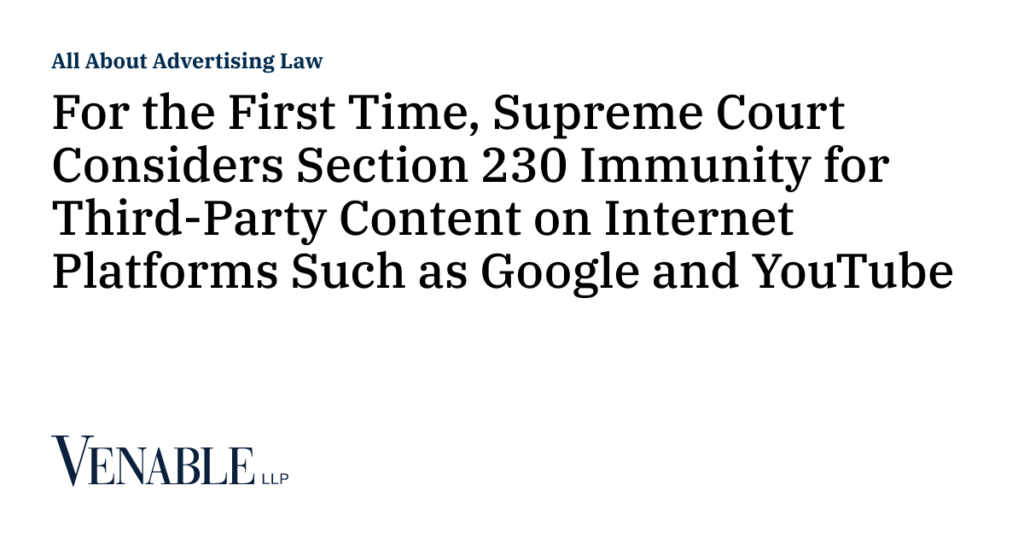For the First Time, Supreme Courtroom Considers Part 230 Immunity for Third-Celebration Content material on Web Platforms Corresponding to Google and YouTube

[ad_1]
In what may very well be a seminal case of the Web age, the U.S. Supreme Courtroom this week heard arguments in Gonzalez v. Google, its first case regarding the hotly debated Part 230 of the Communications Decency Act. The case’s potential ramifications is likely to be gleaned from the 70-plus amicus briefs filed by main firms, states, elected officers, and organizations.
Part 230 gives immunity to Web platforms from legal responsibility arising out of third-party content material posted to the platform’s web sites. The statute prevents a “supplier or consumer of an interactive laptop service” from being handled as “the writer or speaker of any info offered by one other info content material supplier.” On this case, the Gonzalez household sued YouTube for making focused suggestions of recruitment movies created by the terrorist group ISIS. The Gonzalez’s daughter died in an ISIS terrorist assault, they usually declare that Part 230 shouldn’t defend YouTube from civil legal responsibility when its algorithms really helpful dangerous content material resembling these movies.
YouTube’s father or mother firm, Google, countered that just about each main Web platform makes use of algorithms to offer content material to customers, for quite a lot of causes, and that limiting Part 230 to exclude safety the place algorithms are used would stifle the Web because it’s recognized right this moment.
Though oral argument on the Supreme Courtroom can not predict the end result of a case, it gives perception into what points concern the justices. With their questions, the justices grappled with whether or not using algorithms by Web platforms created content material. They spent a lot of the argument attempting to tell apart the distinction in outcomes, if any existed, between Web platforms merely organizing and prioritizing content material versus taking actively recommending and pushing content material to customers.
Justice Clarence Thomas requested if and the way a “impartial” algorithm recommending content material may very well be seen as aiding and abetting illegal conduct. The identical algorithms that push excessive terrorist content material may additionally push rice pilaf recipes or cat movies, to call a number of the examples posed at argument.
Justice Sonia Sotomayor queried whether or not the platforms may very well be held answerable for writing algorithms that inadvertently discriminate towards a category of people. Google’s counsel responded that such an interpretation would allow a deluge of negligence and product legal responsibility claims, with any consumer capable of deliver a lawsuit in the event that they have been sad with how platforms introduced content material to them.
A ruling that curtails Part 230’s immunity may change the type of content material that customers see. Google warned that if the Courtroom adopted the Gonzalez’s studying of Part 230, platforms is likely to be pressured to aggressively censor third-party content material, together with ads, ensuring solely essentially the most benign content material is allowed to look on their websites.
The justices additionally brazenly apprehensive in regards to the sensible penalties of opening platforms to go well with based mostly on third-party content material. Chief Justice John G. Roberts famous that giant quantities of content material are fed to customers based mostly on individualized metrics. Justice Brett M. Kavanaugh additionally famous such a change may result in a flood of lawsuits and nodded to the priority that such a change may “crash the digital financial system.”
Justice Samuel A. Alito and Justice Ketanji Brown Jackson appeared amenable to reviewing how the decrease courts have interpreted Part 230. Alito advised that any content material posted on-line that isn’t displayed randomly by platforms may very well be thought of “publishing” and subsequently outdoors of Part 230’s safety. Jackson questioned Google’s counsel about whether or not Congress had right this moment’s algorithms in thoughts in any respect when it crafted these protections.
The Solicitor Basic’s Workplace appeared to take a middle-ground view, looking for to protect the excellence between a platform’s resolution about the right way to distribute third-party content material and the content material itself. The federal government didn’t help a legal responsibility exception for when a platform makes a suggestion with out the consumer requesting it, however did help exemption if a platform someway included its personal remark or endorsement of that third-party content material.
In response to Kavanaugh’s concern that such an exemption would seize virtually all algorithmic actions, the federal government famous that if a state legislature enacted laws that prohibited Web platforms from prioritizing firms that marketed with them, there was an open query of whether or not that violated the Commerce Clause or First Modification. The federal government famous that it most well-liked courts to take a look at the weather of the reason for motion relatively than whether or not immunity was correct beneath Part 230.
In a lighter second throughout arguments, Justice Elena Kagan dryly famous that the Courtroom was not composed of the “9 biggest consultants on the Web” and requested why they need to not go away it to Congress to amend Part 230.
The Courtroom is anticipated to launch a call this summer season. The way it decides the Part 230 query might form how content material is shared on the Web. As soon as the Courtroom points its resolution, and if it decides to listen to whether or not to assessment the constitutionality of Texas and Florida’s censorship legal guidelines, the Web panorama faces doubtlessly important adjustments within the close to future.
For extra insights into promoting regulation, bookmark our All About Promoting weblog and subscribe to our month-to-month publication.
[ad_2]
Source_link








